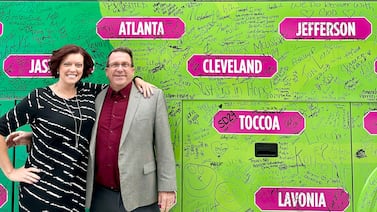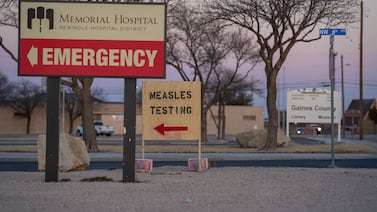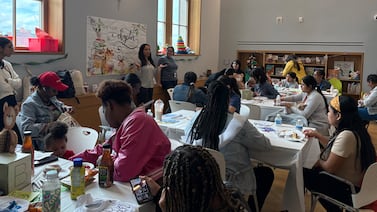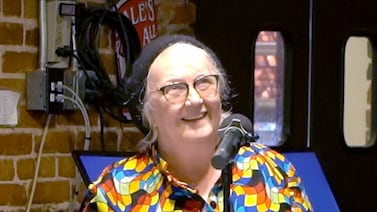Public health, explained: Sign up to receive Healthbeat’s free Atlanta newsletter here.
Over the course of her 40-year career as a nurse, people have gained greater access to information, and that’s both a good and bad thing, said Patricia Horton, the CEO of the Georgia Center for Nursing Excellence.
Patients are more empowered, but many also suffer from information overload, receiving confusing messages about vaccines and other health issues, Horton said.
As trusted messengers with close links to their communities, nurses are tasked with helping people understand health information, Horton said. It takes perseverance.
“There’s a light at the end of the tunnel, and we just have to keep on trying and trying different ways of getting that information out there,” Horton said. Emphasizing positive stories and listening to people’s personal concerns are effective ways to share good information.
Horton founded the Georgia Center for Nursing Excellence in 2021 to gather data and insights about the state’s nursing workforce. The nonprofit’s data dashboard tracks supply and demand, wages, job postings, and other aspects of the workforce, for RNs (registered nurses), LPNs (licensed practical nurses), and CNAs (certified nursing assistants).
The organization also sponsors a summit where nursing leaders can interact with professionals from other industries and a mentorship program to help new nurses adjust to their jobs, with the hopes that they won’t leave the profession. The dashboard shows that about 153,544 nurses worked in Georgia in 2024, and the state is short by an average of 772 RNs each year, with LPNs and CNAs also facing shortages.
Healthbeat recently spoke with Horton about nursing in Georgia. This interview has been edited for length and clarity.
What role do nurses play as trusted messengers in their communities?
Nurses have been, for upward of 20 years, the most trusted profession, and so we really see that as an opportunity to work in our communities. Many times they’re the ones giving the vaccines, [they] go out and talk to their community, whether it’s in a church setting, school setting, because they have that trust, and [are] trying to share the things in a way that people understand it.
How do nurses deal with anti-vaccine messages?
It is very difficult. We’ve had lots of discussions about that, because it can be very frustrating, especially the science and the reasons behind things. But we keep on trying to put a positive spin on it. Many people have to hear the message and see things and hear stories. One of the things that we’re really trying to get better at in nursing is sharing the stories. What are the benefits? How can we help you? And how can we help you understand? It may take one in that family to believe it and do something, whereas the rest of the people in that family might come along. It’s a constant effort.
We don’t believe in giving up hope. There’s a light at the end of the tunnel, and we just have to keep on trying and trying different ways of getting that information out there … What are the other ways we can get information [to] people and have them see a different perspective and get beyond the political side? We’re more alike than we are [different], and if we can look beyond that, and see what the benefits are, then you’re more likely to reach them.
Is that something that’s changed over the course of your career?
It has changed over my career, because over time, the whole technology of looking on the internet, all of the information that’s shared now, and the way things are shared … The good part of it is, hopefully it has increased the information that patients and families have access to, but on the other hand, many times the information that they’re seeing is not always accurate. So it has made things more challenging.
People will continue to be informed in different ways, and it’ll be our responsibility in the medical field to make sure that we share the correct information and the science behind things.
What contributes to nursing turnover and people leaving the profession?
A … study that was surveying nurses and what impacts them and their intent to leave [found causes to be] stress and burnout, which has to do with workload, under-staffing, inadequate salary, and workplace violence. … Workplace violence has significantly risen to the top, more so during Covid, and has continued to remain a concern, in even nursing homes, as well as hospitals. It’s being addressed with policies and standards being put in place.
Obviously, we always focus on recruitment, because you’re constantly having a need to fill positions. But truly our focus needs to be on retention, because in order to have recruitment, you really have to have strong retention of the individuals that you bring on board.
There’s been a lot of focus and effort on residency programs to really work with our new graduate nurses that are coming along. The intent to leave is much higher early on, and that’s why many [hospital systems] have focused on residency programs and really leaning in with mentors. Turnover costs a significant amount and has an impact on the quality of care you deliver.
What other challenges face the profession in Georgia?
We saw for a period of time, especially during Covid, and a little bit after that, a decline in the number of nurses applying for the nursing programs … Now we’ve seen an increase. The challenge with that is there are many that are not able to be accepted because we also have a faculty shortage.
And the other challenge is clinical placement. Mostly their training is done in hospitals, and hospitals can only take on so many students at a time.
Are you a nurse? Healthbeat wants to hear from you. Please take our new survey about the health needs in the communities you serve. Your input helps inform our public health newsroom — and only takes 5 minutes. As a thank you, five participants will be randomly selected to receive a $50 Amazon gift card. And please pass it along to nurses in your network.
Rebecca Grapevine is a reporter covering public health in Atlanta for Healthbeat. Contact Rebecca at rgrapevine@healthbeat.org.







